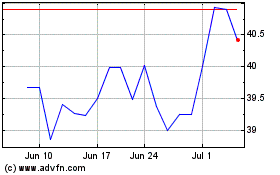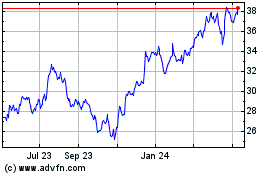By Ruth Simon and Peter Rudegeair
Griff Neal set his alarm for 3 a.m. on Friday so he could be
among the first to apply for a loan under a new federal program
designed to help small businesses weather the coronavirus
pandemic.
Bank of America Corp. turned him away that same morning. The
reason: The auto-parts supplier he runs, Encap Technologies Inc.,
hadn't borrowed from the bank before.
"I was literally floored," said Mr. Neal, the company's
president. Encap, he said, has had checking and savings accounts
with Bank of America for two decades, and the bank manages its
employee retirement accounts.
Small-business owners have flooded banks with applications for
the Paycheck Protection Program, a $350 billion chunk of Congress's
$2 trillion coronavirus stimulus package meant to help small
companies and keep workers off the unemployment rolls. Many were
quickly rebuffed because they don't have the right kind of ties to
the banks offering the loans.
Bank of America changed its stance Saturday after customers
inundated it with complaints, dropping the requirement that
applicants have a prior lending relationship with the bank. But the
episode rattled small-business owners, who are worried that the pot
of money will run out before they are able to dip into it. The
funds are being distributed on a first-come, first-served basis and
could run out within weeks unless Congress steps in. Wells Fargo
& Co. said on Sunday interest from customers indicated it has
already "reached its capacity."
Mr. Neal tried again Saturday morning after a Bank of America
loan officer informed him that the bank would accept his
application. Though Encap is now eligible, many others aren't; Bank
of America isn't taking applications from customers that have
borrowed money from other banks.
Mr. Neal received a confirmation from Bank of America that it
had received his application and would follow up with a request for
documentation. He said he worries that Bank of America will be too
overwhelmed to quickly process his application.
"Will we get this funded in a reasonable time before the money
runs out?" he said. Palatine, Ill.-based Encap, which employs less
than 100 people, expects revenue to drop by a third, to $20
million, this year.
A Bank of America spokesperson said the bank's initial decision
to focus on existing borrowers was meant to speed up the
application process. "If everybody shows up at Bank A or Bank B or
Bank C, that means it's going to slow down the process," Chief
Executive Brian Moynihan told CNBC on Friday.
The Paycheck Protection Program began accepting applications on
Friday. It provides government-guaranteed loans to cover eight
weeks of payroll and other expenses, which are forgivable if
businesses keep their workforces largely intact and use the loans
for eligible expenses such as rent and utilities.
For now, the loans are only available through banks that already
participate in other Small Business Administration lending programs
-- a group that includes most of the biggest U.S. banks. The
Treasury Department has said it plans to allow other lenders to
participate but hasn't detailed a timeline.
Big banks have the scale and manpower to get money out of the
door to a large number of small businesses. Bank of America said
about 171,000 of its customers applied for payroll loans worth more
than $32 billion. JPMorgan Chase & Co., which started accepting
applications Friday afternoon from companies that had a checking
account at the bank, has more than four million small-business
clients. Wells Fargo said it would only consider making payroll
loans for nonprofits and existing customers with fewer than 50
employees and that it would only extend $10 billion under the
program, citing a regulatory cap on its balance sheet.
Some business owners said they were initially led to believe
that banks would process their applications -- only to find at the
end of last week that this wasn't the case.
Jim Hourdequin, chief executive of Lyme Timber Co. in Hanover,
N.H., spoke with a couple of banks about the loan program before
settling on Bank of America for the seven of his portfolio
companies that have banking relationships with the big bank.
On Friday, he was told his businesses didn't qualify. The
about-face was "grossly unfair to businesses, such as ours, that do
not use debt through the bank," said Mr. Hourdequin.
On Saturday, the bank's message to Mr. Hourdequin changed again.
Lyme's small logging and forest management companies, which
together employ 63 people in rural communities, were now eligible
to apply for a payroll loan under the bank's new guidelines.
The big banks' decision to focus on existing customers could
hurt smaller and minority-owned businesses that are less likely to
have accounts with them, as well as businesses in rural areas where
they have fewer branches. Firms owned by African-Americans were 20%
less likely to obtain financing at large banks than white-owned
businesses with similar profitability, credit risk and other
factors, according to researchers at the Federal Reserve Banks of
Atlanta and Cleveland.
"If banks only serve their customers, then the very businesses
that may need access to the PPP program most will be left out in
the cold, no question," said Michael Korengold, chief executive of
Enhanced Capital Group LLC, a nonbank lender focused on financing
small businesses in underserved areas.
Mr. Korengold said his firm would like to make loans through the
new program, but still isn't sure how companies like his apply to
participate.
The Treasury Department's rules for the program give banks a
powerful incentive to focus on businesses they already know.
Lenders have to collect enough information from first-time
applicants to ensure they aren't criminals or money launderers to
avoid being fined by regulators. For existing customers, though,
banks don't have to do any additional homework to ensure their
borrowers are in compliance with the law.
Conor Forde, the owner of a San Francisco painting contractor,
was able to use Bank of America's online portal on Friday to apply
for a loan to keep paying his 16 employees because he has a credit
card and checking account with the bank.
"It was incredibly easy," said Mr. Forde, who figures the whole
application process took him about 10 minutes. On Sunday, he got an
email from Bank of America telling him to gather documents needed
to process the loan, including last year's tax return and payroll
information.
Mr. Forde said his wife, Kelly, was turned away the first time
she tried to apply because her child care business doesn't have a
credit card, line of credit or business loan with Bank of
America.
Mrs. Forde tried again on Sunday. Bank of America accepted her
application.
Write to Ruth Simon at ruth.simon@wsj.com and Peter Rudegeair at
Peter.Rudegeair@wsj.com
(END) Dow Jones Newswires
April 06, 2020 08:14 ET (12:14 GMT)
Copyright (c) 2020 Dow Jones & Company, Inc.
Bank of America (NYSE:BAC)
Historical Stock Chart
From Mar 2024 to Apr 2024

Bank of America (NYSE:BAC)
Historical Stock Chart
From Apr 2023 to Apr 2024
